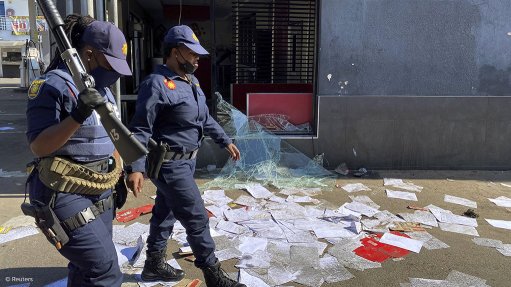
Photo by: Reuters
The chairperson of the Pietermaritzburg and Midlands Chamber of Business said police officers were instructed to stand down during the deadly July unrest.
Testifying before the SA Human Rights Commission's (SAHRC) hearing on Thursday, chamber CEO Melanie Veness claimed police officers were told not to get involved in the unrest.
Pietermaritzburg was among the areas affected by the unrest that claimed over 350 lives and wreaked havoc in parts of KwaZulu-Natal and Gauteng.
Veness told the SAHRC commissioners the unrest was devastating and traumatising as she described seeing the mayhem and bodies strewn along the roadside at the peak of the riots.
She said the Pietermaritzburg area was plunged into complete chaos, with no assistance from local police or the likes of KwaZulu-Natal Premier Sihle Zikalala, who she said she personally attempted to contact.
She testified that she attempted to contact many of the police officials working with the chamber, but said she received no response whatsoever.
Veness claimed that after the dust had settled, police officials said they were told by their leaders to stand down and not intervene in the mass looting and violence that ensued during the unrest.
She said, "We have been directly told by some police personnel that they were told to stand down and not get involved. It came from their leadership. They received instructions from somewhere that everyone had to obey."
She said some officers told her they were stocked with crowd control weapons, but never used them.
"They had teargas but weren't allowed to use it themselves. I tend to speak to people like the brigadiers and captains, I have their cellphone numbers and there was no response.
"We were alone helplessly watching this stuff unfold. The looting went on for days. People sat on the side of the road with their looted goods waiting for their transport."
Veness said she only made contact with Zikalala long after the unrest.
"It was a while after the unrest that the premier called a meeting. I was very vocal and told them publicly that from the ground there was complicity. We were also told our local politicians were fine with the looting.
"They were not saying the looting is wrong. If you are not going to condemn what happened and you value the investment, you give some kind of reassurance to business and people. That still hasn't happened."
She said in one instance, Richmond police told farmers, who had learnt from their workers of an imminent attack on their farms, that they would not be able to go out and help.
"I eventually got hold of the provincial commissioner, who said he would instruct the Richmond SAPS to activate."
The destruction was coordinated
Explaining the devastation she saw during the unrest, Veness said: "I walked past young people's bodies. It was terrible, I don't want that to happen in our country again. The economic impact is massive. But I think the trust deficit that remains will cost our city and country."
She said the destruction was coordinated, and people were desperately seeking help, but none came.
"To listen to what people have gone through brings it home. Barnsley Road, most businesses were destroyed, it seemed like a warzone, it was completely devastating. It was wanton destruction, they destroyed machinery.
"You could see how orchestrated it was. You could see how people went ahead and removed water sprinkling systems, spray painted on the walls, destroyed things that were in there, defecated."
Vaness added, "It was heartbreaking to see the destruction of life."
Veness said some businesses tried to acquire additional security, but there simply wasn't any.
"Businesses have security guards. Some of them tried to help when we realised we would not get help from SAPS. But many security officials, because of transport, many could not get to work. A lot tried, but security services were short of people.
"They were getting calls from Durban and everywhere but there were just not enough people. I tried to call security companies that members wanted for help, but we could not get that."